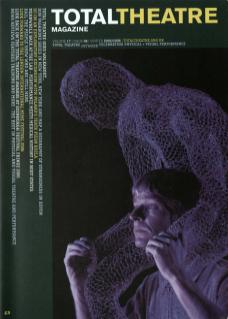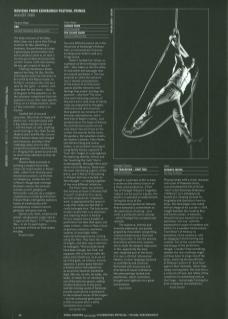Two very different pieces set in the University of Edinburgh's McEwen Hall, an extraordinary Victorian building never before used as a Fringe venue.
Reder's Guided Tour allows us a glimpse at the terrifyingly Grand Hall – then takes us into the dimly lit and rather dull passages that are around and below it. The Tour purports to 'draw the audience into a shared contemplation of the nature of architectural spaces and the memories and feelings they evoke' but begs the question why here? The most vital and interesting sections of the piece are a slide show of family snaps accompanied by thoughts, reflections and reminiscences that question our notions of 'real' histories and memories, and a final film of Reder's mother, cast wonderfully as The Angel of History. The architectural spaces we are truly drawn into are those on the screen: the seaside family home, the gardens, the suburban streets, the mother's kitchen. Peter Reder, like William Ylang and Joshua Sofaer, is an excellent monologist using family history captured in 'true-life' images as a springboard for exploring identity, history and the 'inventing the truth’ that is autobiography. Although there were some local references, these were the least interesting aspects of the piece, and it felt as if the placing in McEwen Hall was a tacked-on afterthought – a merging together of two very different intentions.
The Silver Swan, by contrast, felt entirely at home in McEwen Hall. It wasn't created for this space, but like all good site-responsive work, it appropriated the space in a way that made you feel that it really belonged here. The ludicrously ornate circular hall is so enormous and imposing that it is hard at first to imagine how a handful of performers can take that space and make it theirs – then in float a flock of glorious creatures, enormous swathes of moonlight – white material billowing around, trailing along the floor. They have the voices of angels, and they sing a selection of madrigals. That actually would have been enough, but Clod, one supposes, felt a need to make the piece more theatrical, so as we sit up in the gods, we witness, directly opposite, a power game between a woman and a man played out as an action/reaction movement duet. She sits, he sits; he walks, she walks. It makes for an interesting use of the balcony spaces, adding another dimension to the piece and the echoing sound of footsteps provide a percussive counterpoint to the resonant voices of the singers – but the witnessed game grows a little tiresome after a while. Sometimes less is more.

